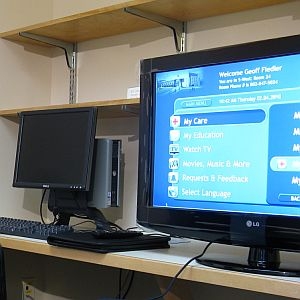 (Host) Fletcher Allen hospital will launch a new computerized system this summer to help patients learn more about their health while they recuperate from surgery or an illness.
(Host) Fletcher Allen hospital will launch a new computerized system this summer to help patients learn more about their health while they recuperate from surgery or an illness.
Officials say the bedside lessons are aimed at reducing the chance of patients ending up back in the hospital.
VPR’s Ross Sneyd explains.
(Sneyd) Many patient rooms at Vermont’s largest hospital are filled with the sounds of television on a typical morning.
(sound of Today)
(sound of The View)
(Sneyd) "The Today Show." The talk show "The View."
(sound of Divorce Court)
(sound of commercials.)
(Sneyd) "Divorce Court." Commercials.
For many patients, the drone of the television is a little company while they wait for a test or a procedure, or just as they heal.
Doctor Melinda Estes wouldn’t mind if her patients had a little more to see on those ubiquitous TV screens.
(sound of educational video)
(Sneyd) Maybe a video that explains something about the medical condition that’s brought the patient to the hospital.
Now, such a tutorial will be part of a new interactive, video-based system of education and entertainment at the hospital.
Doctor Estes is Fletcher Allen’s CEO.
(Estes) "It has the things that we provide today in terms of TV. And let’s be honest, people spend long hours in the hospital and oft times cannot read, don’t want to read, don’t have visitors. And so the ability to deliver video content is important in whatever platform."
(Sneyd) But this system has a lot more. Patients can order lunch. Surf the Web. Or take some time to better understand a disease or ailment – and how to better care for themselves. The expanded knowledge might help the hospital reduce the number of times a patient has to be readmitted for additional treatment.
For Estes, that’s the value.
(Estes) "It enables me as the patient to take some control over what’s going on with my care that day. And certainly that’s important. Anyone who’s ever been in the hospital, you can very quickly have a sense of loss of control because a lot of things are happening around you and happening to you."
(Sneyd) The hospital’s electronic health records will keep track of what educational videos a patient has watched. That will help doctors and nurses know how well prepared a patient is to be discharged.
The system was paid for by a $1 million donation from the foundation established by Pizzagalli Construction.
Remo Pizzagalli says it was important to him that patients would be able to easily operate the new system.
(Pizzagalli) "I think it’s great. One of the first questions I asked when I came in here was ‘how simple is it going to be to use’? I’m not a real buff on all kinds of communications. But they showed me and I think it’s very easy to use."
(Sneyd) The controls are built into the familiar "pillow wand," the device in a hospital bed that has controls for the television, to adjust the bed height and to call a nurse.
The devices are expected to be in every patient room at the hospital by mid-June.
For VPR News, I’m Ross Sneyd.